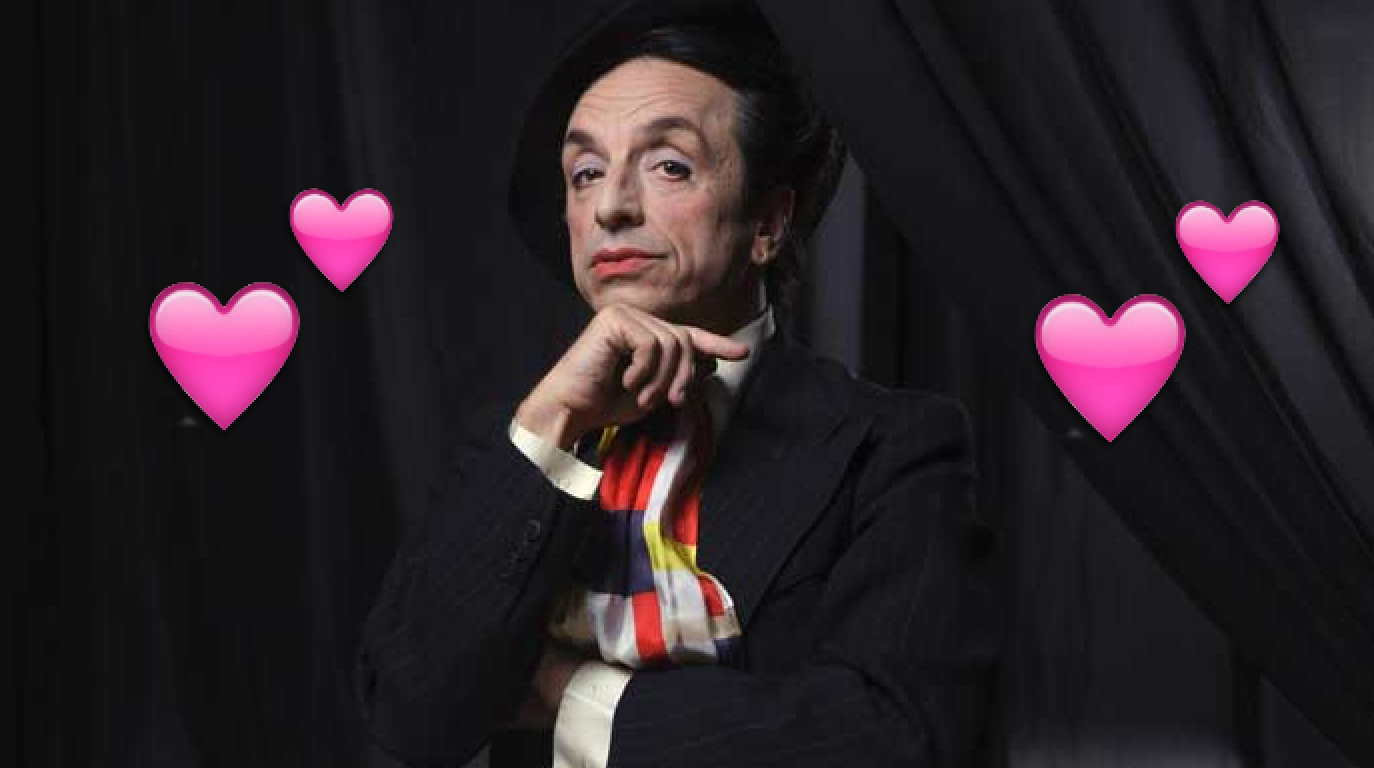Paul Capsis On Becoming Quentin Crisp
By Maxim Boon
Eyelids lightly dusted in pale blue shadow; cracked parchment cheeks smudged with rouge. A pinched, birdlike face, part smile part sneer, framed with a wispy yet meticulously styled purple-grey quiff and topped by a well-appointed, listing red velvet fedora. Orating with a devil-may-care irreverence in his curdling R.P. accent, Quentin Crisp’s gender-bending style, arid wit and talent for shock and awe earned him both adoration and infamy during his lifetime. But while he was unquestionably a trailblazer of queer culture, Crisp was a reluctant poster boy for a movement he never wanted. Summarised by gay rights activist Peter Thatchell as a “self-hating, arrogant, homophobic gadfly,” Crisp was notorious for his oxymoronic attitude to Pride and Gay Liberation, once noting, “What is there to be proud of? I don’t believe in rights for homosexuals.”
And yet today, 17 years after his death, Crisp still holds an enduring fascination as one of the first gay celebrities to be truly vocal about their sexuality and lifestyle. For Australian cabaret star Paul Capsis, his first contact with Crisp was a formative moment. “I first came across him in a magazine, probably a homosexual edition of the glossies,” Capsis recalls. “I couldn’t believe such a person existed. At the same time that my own grandparents existed! I couldn’t imagine someone the same age, who dressed and behaved the way he did, could be real. It was like an arm had reached out of the pages and grabbed me as if to say, ‘Paul, wake up! Homosexuals have always existed!’”

Capsis, whose own innate flamboyance has made him one of Australia’s most intoxicatingly entertaining fringe performers, has immersed himself in the extraordinary life of Crisp as he prepares to portray him in Fortyfivedownstars’ production of Tim Fountain’s Resident Alien. It’s a double-edged honour, he tells me. “I won’t lie, it’s been a challenge, but that’s probably why I took it on – I’m a glutton for punishment! It’s been very difficult figuring out how to fit inside his skin,” Capsis says. “On some levels we’re rather similar, but we’re also extremely different. I’m very expressive in my voice and movements whereas he was very still. I don’t have his intellect or his way with words. I grew up in a very conservative, religious, working class household, where English wasn’t the first language, so I’m different in my cultural DNA. But like Crisp, I was confronted by my own effeminate homosexuality and that’s where I really identify with him. We both experienced extreme hostility – he as a young man in England in the 30s and 40s, and me as a kid of the 70s in Sydney.”
Crisp’s legend has been captured in film and theatre in such an astute yet heightened way that as a character, he has almost passed from the biographical into the realm of fiction. Screenwriter Philip Mackie’s 1975 adaptation of Crisp’s autobiography, The Naked Civil Servant, starring John Hurt, catapulted Crisp, almost overnight, from relative obscurity to household status. The film detailed a life so unashamedly eccentric and clandestine, that it almost defied belief.

Crisp’s brave but often harrowing recollections of being persecuted as a child and a young man, largely due to a refusal to hide his effeminate mannerisms and sexual appetites in a time when homosexuality was still criminalised, suggested a kind of heroism. And yet his life as a naked model, rent boy and master raconteur placed him adjacent to a seedy, sticky underbelly of moral filth that simultaneously made him a social pariah.
It’s these contradictions – a homophobic gay icon, eloquently spoken yet scandalising – that makes Crisp such a compelling figure for Capsis, even if there are counterintuitive aspects to the role. “Crisp once told an interviewer, ‘The only thing I do at home is sit, think, blink and breathe. I don’t do anything else.’ And I think that was probably quite true. So bringing him to the stage is interesting because you have to resist the urge to invent gestures that weren’t his. In many ways Resident Alien isn’t a play, it’s a lecture. There’s very little action – all he does is boil an egg! But the ideas and the language are phenomenal. It’s not at all easy. It’s like brain surgery for me; like I’m speaking Japanese or something.”
In his youth, Crisp’s lifestyle had made him a risque anathema to polite society, but as the 20th century drew on and attitudes towards different sexualities thawed, he became better known for his thoughts, rather than his deeds. A move to America at the beginning of the 1980s, already aged 73, would see his candid ideas entrench his reputation as a divisive character within gay culture. As the gay community became more visible, and butch machismo became a prized characteristic, his camp idiosyncrasies and faye style appeared dated and foolish.

Crisp’s apparent retaliation to this rejection deployed his deadliest weapons: his words. He infamously branded AIDS a “fad” and quipped that if a method of testing could determine if a foetus would become gay, those unborn babies should be aborted, adding “homosexuality is a terrible disease.” The fact that these sentiments closely mirrored the most bigoted ideals of the conservative right didn’t seem to matter, but his outspokenness came at a price. Despite being the world’s most famous queer commentator, living in New York City on the front line of both the Gay Liberation movement and the AIDS epidemic, his personal demons and caustic opinions saw him shunned, vilified and alienated by gay society.
While he admits to disagreeing with Crisp’s conclusions on gay culture (“If he were alive today and living in Australia, I suspect he would be a liberal voting, Abbott-loving type of homosexual”), Capsis can empathise with his feelings of dislocation within the gay community. “You can picture him there, can’t you,” Capsis explains. “He’s in New York, and all of a sudden all of these homosexual men are wearing boots, and kitchen-tablecloth shirts and handlebar moustaches, and of course he was entirely outside of that world. As was I. I remember when I came out at 17 and I went to gay clubs, everyone was trying to look the same. I thought, ‘For fucks sake. Aren’t we meant to be free of all this shit?’ So I can understand why Crisp described himself as a minority within a minority.”
Becoming Crisp may have been a challenge for Capsis, but at least it hasn’t entirely been a one-way transaction. Looking through Crisp’s eyes has given Capsis an interesting perspective on the modern world. It’s a place, Capsis believes, that Crisp would not approve of. “He’d be ripping out his few strands of purple hair with the political correctness that’s everywhere nowadays,” Capsis insists. “He may not have always said what people wanted to hear. He may have said things that people didn’t always agree with, but he never changed who he was. He never faltered or tried to appease anyone, and I think there’s something incredibly powerful about that. It’s a quality you don’t often find today.”
This piece was originally published by Limelight Magazine.
Fortyfivedownstairs presents Paul Capsis as Quentin Crisp in Tim Fountain’s Resident Alien, until June 12.

